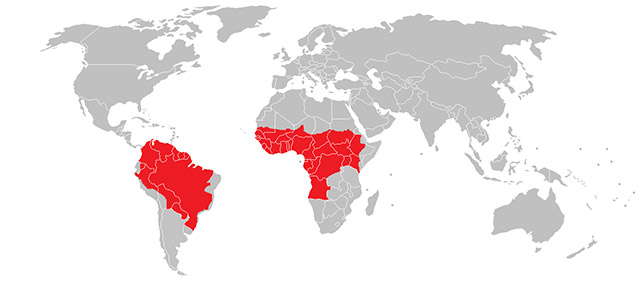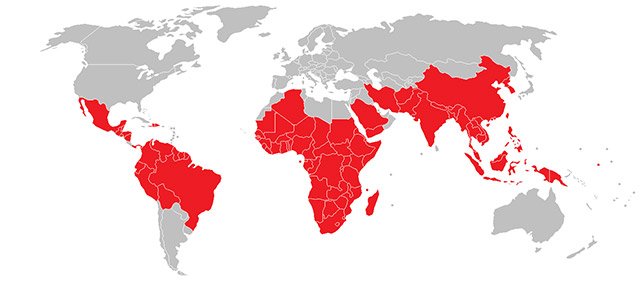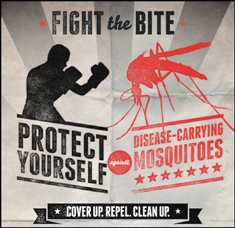Zika is a virus that is closely related to dengue. It is spread by mosquitoes but can also spread through sexual activity.
Zika virus was first reported outside Africa and Asia in 2007 where it caused an outbreak in Yap State (Federated States of Micronesia). Between 2013 and 2015 there were large outbreaks of Zika virus in the Pacific Islands, and in 2015, Zika virus emerged in South America, with spread to many countries in South and Central America and the Caribbean. Zika virus outbreaks are ongoing in the Americas. There is evidence of cases of Zika virus in Southeast Asian countries such as Thailand and Indonesia where the virus may have been present at low levels for many years. I
Symptoms: Most people experience a very mild flu-like infection without any complications. However, it is now known that Zika virus may be passed from a woman to her unborn baby. This can cause potentially serious consequences for the baby, in particular a condition called microcephaly (a small head and brain). Microcephaly is just one of the signs and symptoms of congenital Zika virus syndrome (CZVS) that can be present at birth or appear later in infancy such as seizures (fits), irritability, swallowing problems, hearing and sight abnormalities.
There is no vaccine currently available for Zika virus.
While the majority of people who get infected with Zika virus do not become sick, it is especially a concern for women who are pregnant or planning a pregnancy because of the risk of serious birth defects. The following information is from the Department of Health: “Women who are planning pregnancy or at risk of pregnancy should consider deferring travel or avoid pregnancy during travel to a Zika affected country. They should also avoid unprotected sex and pregnancy for at least 8 weeks following return. Advice relating to a partner who has travelled also applies.
For men with a partner who is planning or at risk of pregnancy and the man has travelled to a Zika affected country or has a diagnosed Zika infection, pregnancy should be deferred for least 6 months after return, or 6 months after the date that Zika virus infection was diagnosed.” http://www.health.gov.au/internet/main/publishing.nsf/Content/ohp-zika-factsheet-basics.htm
The best prevention for Zika virus, and other mosquito-borne diseases for which there is no vaccine available, such as Chikungunya and Dengue viruses, is avoidance of mosquito bites. The Department of Health makes the following recommendations:
- Cover up as much as possible, eg. Wear light coloured long-sleeved shirts and long pants.
- Use insect repellents as frequently as recommended on the label. The most effective mosquito repellents contain Diethyl Toluamide (DEET) or Picaridin, but those containing oil of lemon eucalyptus (OLE) (also known as Extract of Lemon Eucalyptus) or para menthane diol (PMD) also provide adequate protection. Repellents containing DEET or picaridin, are safe for pregnant and breastfeeding women and children older than 2 months when used according to the product label.
- When using both sunscreen and insect repellent, apply the sunscreen first and then the repellent.
- Use insecticide-treated (such as permethrin) clothing and gear (such as boots, pants, socks, and tents).
- Stay and sleep in screened-in or air-conditioned rooms, and use bed nets if you cannot keep mosquitoes outside.
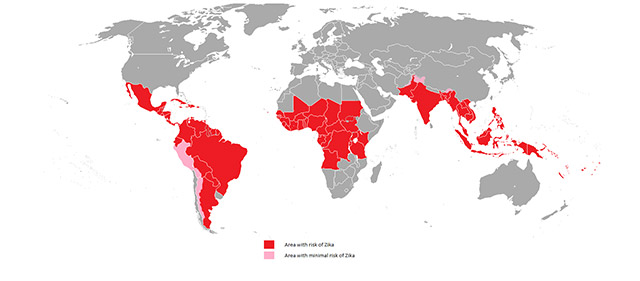
Risk regions for Zika (Source: healthwa.wa.gov.au)
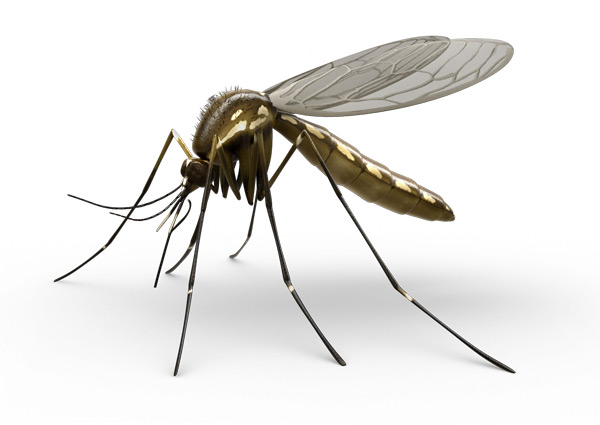 Mosquitoes can carry diseases that can be passed on to people through mosquito bites. These diseases are caused by bacteria, viruses or parasites transmitted by mosquitoes. Nearly 700 million people get a mosquito-borne illness each year resulting in over one-million deaths.
Mosquitoes can carry diseases that can be passed on to people through mosquito bites. These diseases are caused by bacteria, viruses or parasites transmitted by mosquitoes. Nearly 700 million people get a mosquito-borne illness each year resulting in over one-million deaths.
